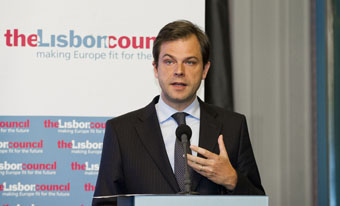April 2015
Future Directions for Scientific Advice in Europe

n collaboration with the Centre for Science and Policy at Cambridge University and the European Commission, the Lisbon Council convened the High-Level Summit on Future Directions for Scientific Advice in Europe. James Wilsdon, professor of science and democracy at the University of Sussex, presented Future Directions for Scientific Advice in Europe, a new book framing the future of evidence-based policymaking and scientific advice in Europe that was launched in the margins. António Vicente, head of cabinet for Carlos Moedas, European commissioner for research, science and innovation, kicked off the debate with a fascinating overview of the European Commission’s reflection on institutionalising scientific advice in the European Commission, which will soon culminate in proposals. Ian Chubb, chief scientist of Australia; Robert Doubleday, executive director of the Centre for Science and Policy at the University of Cambridge; Ulrike Felt, professor of science and technology studies at the University of Vienna; Robert Madelin, director-general for communications networks, content and technology at the European Commission; Nathalie Moll, secretary-general of Europabio; Wolfgang Rohe, executive director of the Mercator Foundation; Vladimír Šucha, director-general of the Joint Research Centre at the European Commission; and Lieve Van Woensel, head of scientific foresight service at the European Parliament, joined a high-level panel.